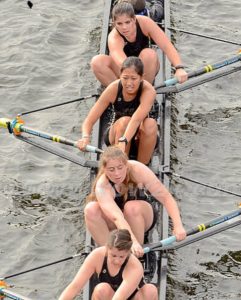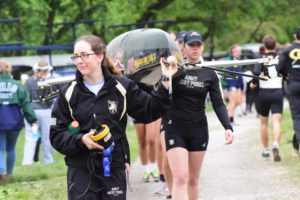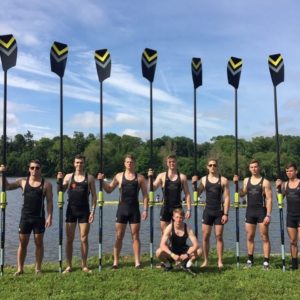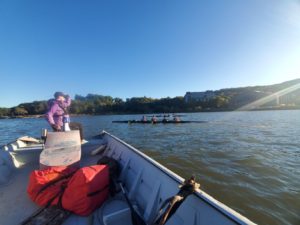By Kate Brownson, Equipment Specialist, Army West Point Crew
“Make the boat go faster:” From my introduction to rowing in 2001 until I arrived at West Point on November 1, 2015, whether I was a rower or a coach, the top priority for every team was to make boats go faster.
But only days after I was hired to oversee and manage the 84-member rowing team at the U.S. Military Academy, LTC Matt Burrow, the Officer in Charge of the Army Crew Team, explained to me that our main mission with Army Crew is the development of the cadets so they become the best officer they can be when they graduate. In turn, by doing this, we will make boats go fast.
West Point was the first time I had heard that the main mission of rowing was to develop a person’s character to better prepare them for their occupation. In order to fully understand the mission of Army Crew, I observed how Matt and the other coaches that first year used rowing to prepare cadets to become officers. Matt was the ultimate guru of how rowing relates to the Army. His approach reminded me of the movie, “My Big Fat Greek Wedding,” where Toula’s father always challenged her friends by asking them to “give me any word and I show you how the root of that word is Greek.” Matt never directly challenged anyone like this but he could relate different aspects of rowing to the Army.
 One simple example that sticks out in my memory is of a cadet who was carrying his oar with the blade behind him. Matt stopped him, reminded him to carry the oar with the blade in front and followed up with, “You would never carry your firearm at your side pointed behind you.” BAM! rowing related to Army. Still puts a smile on my face thinking how he creatively linked rowing to the Army. So this got my mental gears turning: how can I use the sport of rowing to help develop cadets into officers? Oh boy, did Matt Burrow’s way of thinking open my Pandora’s box.
One simple example that sticks out in my memory is of a cadet who was carrying his oar with the blade behind him. Matt stopped him, reminded him to carry the oar with the blade in front and followed up with, “You would never carry your firearm at your side pointed behind you.” BAM! rowing related to Army. Still puts a smile on my face thinking how he creatively linked rowing to the Army. So this got my mental gears turning: how can I use the sport of rowing to help develop cadets into officers? Oh boy, did Matt Burrow’s way of thinking open my Pandora’s box.
Now having worked at West Point for six years, I’ve learned that so many things correlate rowing with preparation for the Army and leadership. Take educating the cadets on the importance of maintaining and properly assembling the rowing equipment so they can fully complete practices or competitions. In the grand scheme of it, failure to properly check/maintain your rowing seat at worst can lead to risk of losing advancement in competition. But the overall lesson learned translates into the cadets’ future occupation, where having successful checks and maintenance of equipment means better likelihood of a successful mission and you and your soldiers staying alive. I have realized how rowing is a “safe space” where cadets get the opportunity learn valuable lessons where people’s health and lives are not at extreme risk.
I think about the growth that coxswains and rowers may develop when they make a mistake during rowing. How do they react? If they get hung up on that one bad stroke, then it becomes a continuous bad stroke that soon affects the rest of the boat’s strokes. Rowers/coxswains must react with a solution and not let themselves “drown” in the problem. The cadets’ understanding the importance of self-compassion is something I find extremely important. In their career field, they are  always being challenged, so they need to know that although they may fail at one action, it does not mean the whole mission is a failure. Stroke after stroke, rowing gives rowers/coxswains the opportunity to learn how to analyze a situation and improve on it. This helps the cadet start to make confident decisions on the fly.
always being challenged, so they need to know that although they may fail at one action, it does not mean the whole mission is a failure. Stroke after stroke, rowing gives rowers/coxswains the opportunity to learn how to analyze a situation and improve on it. This helps the cadet start to make confident decisions on the fly.
When I think about what the position of a coxswain has to offer in the development of a cadet, my heart flutters. The quick answer is to obviously lead and command a boat. Each day the coxswain is given the practice mission which he/she then must execute. They get to understand what it is to work with eight people who are at different capacities of “life” that day. But it is still on the coxswain to complete the mission and hold the rowers accountable. I mean, dang! What a great daily way to get the cadet to practice how to execute a mission with “soldiers.” They also start to find their commander voice during their training and understand how much impact their tone makes on their crew. It is extremely rewarding to see how coxswains develop their leadership from Plebe (freshman) to Firstie (senior) year.
I love what the rower position offers cadets. At first hand they get to understand what it is to follow and trust each other. I mean, it’s crazy! You are trusting that the person behind you is going to stay focused and not jab you in the back with the oar. You are trusting the coxswain to keep a safe course. You are trusting your teammates to take accountability for power output in each stroke so you do not have to pick up any “dead weight.” For rowers, how amazing is the selflessness they learn they need to possess. Through crew, rowers have the privilege of learning to understand what it truly means to “follow.” This is huge for an officer who must understand the values needed for leadership, for soldiers to follow their direction. Every day, cadets get to work on those values during practice.
I have really enjoyed the opportunities the cadets have interacting with each other when they are going through adversity. After each water practice, the boatmates debrief the practice. Each time, it gives them an opportunity to learn how to respectfully talk to each other in ways that their teammates will want to listen. At the same time, the debrief teaches the boatmates to understand the importance of feedback and not taking it as criticism (HUGE LIFE VALUES!). I can only imagine as an officer the challenge of motivating people to want to work for you, compared with leadership in a civilian setting. It really all comes down to how you communicate with each other, which happens every day at practice.
I also like that rowing can change one’s “perspective.” Whether it is during an erg piece or a boat lineup, rowing can teach the cadets how their perspectives can help nurture the thought, “I can do this.” A good example is when cadets are put in smaller boats (pairs, singles), with the high probability they could go swimming. At first it is natural for them to be fearful they may flip the boat. But though they may not realize it, I know that they come prepared for that challenge. I am grateful that I have observed one of the required combat swim classes where the cadets learn how to stay alive in war-like scenarios while in the water. So one would think they could handle their fear of flipping a shell. If I am working with a cadet who is struggling mentally with rowing in a smaller boat, I remind them that they successfully completed survival swim and that I will help them get back in the boat.
Another military training exercise that has implications for rowing, and vice-versa, is the Indoor Obstacle Course Test, which I observed in an effort to better understand the challenges cadets are expected to successfully meet. This link shows you a skilled cadet seamlessly going through the course. Watching the Obstacle Course got me thinking about sprint racing. For one, the start: Your boat rows up to the starting line area, then you sit and wait. A skilled rower knows the value of staying in control of their emotions and anxiety. To not let their thoughts of the unknown or past mistakes consume themselves while waiting.
How the cadets normally get tested is in very large groups. They are sent off in intervals of 30 seconds behind each other. You can imagine just like in Fall rowing season racing how much anxiety this could cause, knowing someone is behind you and chomping at the bit to hunt you down. From what I have observed, the cadets that figure out how to play the mental game and not be played by it are more successful than the ones that self-destruct while sitting in the waiting area waiting to be called to the starting line.
Every cadet has an obstacle in the course that is their personal struggle. When they get to that obstacle, where is their head at? Rowers, too, face moments during high-stress racing situations which must be overcome. Where do their thoughts go? Over my years of rowing, I have learned that I better overcome these moments by acknowledging my challenging areas and no longer fearing them. I then approach that area by consciously thinking what I technically need to focus on to pass the challenge. This tactic has immensely helped me throughout my life to not feel “defeated.” When the cadets are faced with a challenge, I find it important to remind them what they have developed in their rowing training.
 Our sport of rowing really sets the cadets up for adversities in life. When I know a cadet has stuck with this sport while at West Point, I know they are a person who is better equipped to face challenges and lead others. I wanted to especially thank the coaching staff that was present my first year at Army Crew and their guidance in how rowing is a developmental tool. I also wanted to thank all the cadets on the Army Crew team that graduated with the Class of 2016, you all set the bar in my expectations for what each cadet strives to become while on the Army Crew team. I will always be appreciative for the patience you all had my first year with reminding me what all the acronyms stood for and briefing me on the Army lingo. I still keep my informative “West Point A to Z” book (gifted by Class of ’16) right on the shelf with my rowing books just in case I need to brush up.
Our sport of rowing really sets the cadets up for adversities in life. When I know a cadet has stuck with this sport while at West Point, I know they are a person who is better equipped to face challenges and lead others. I wanted to especially thank the coaching staff that was present my first year at Army Crew and their guidance in how rowing is a developmental tool. I also wanted to thank all the cadets on the Army Crew team that graduated with the Class of 2016, you all set the bar in my expectations for what each cadet strives to become while on the Army Crew team. I will always be appreciative for the patience you all had my first year with reminding me what all the acronyms stood for and briefing me on the Army lingo. I still keep my informative “West Point A to Z” book (gifted by Class of ’16) right on the shelf with my rowing books just in case I need to brush up.
~ Kate Brownson rowed for West Virginia University (2006-2011), placing third in the Varsity Four plus coxswain at the 2010 NCAA Big East Championships. After coaching for local clubs, high school teams and Vassar College, in 2015, she became manager of coaching at the U.S. Military Academy.
Join the HOSR Committee 50 as we explore leadership + rowing from the service academies’ perspectives in our fourth ‘Story Hour’ via Zoom on Wednesday, March 24, 7:00pm. Register here in advance.

